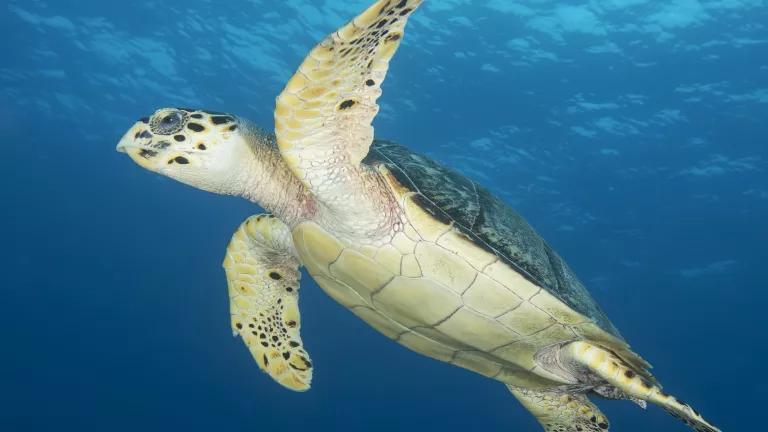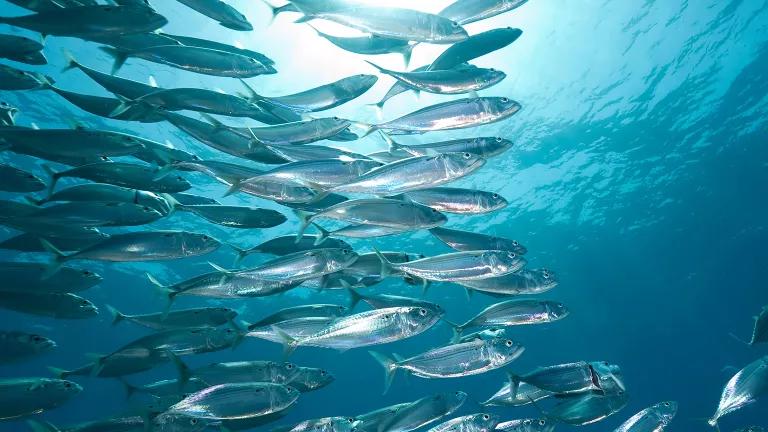Once hunted to scarcity, endangered humpback whales have been making a comeback in New York waters. Rarely seen in recent decades, the cetaceans have been delighting whale watchers in the New York Bight for the last several years, with a high of 87 sightings in 2014. Humpbacks and other whales have also been recorded singing near New York harbor.
No one knows precisely why New York's waters are now hopping with migrating humpbacks, but we hope it is due in part to the state's efforts to protect and improve the ocean resources on which New York's citizens depend. A critical tool for this work has been New York State's Environmental Protection Fund (EPF). Traditionally financed through the Real Estate Transfer Tax (RETT), the EPF supports important research and restoration work aimed at protecting the environment and the communities that rely on its natural wealth.
That's why, today, NRDC staffers are also being spotted in migration - heading to Albany with our ocean coalition partners to encourage the state legislature to increase funding to restore and protect New York's ocean and Great Lakes assets. We're hoping to see the fiscal year 2015-2016 budget include an increase in the overall EPF to $200 million, paid for by the RETT, and in the ocean and Great Lakes line from the Governor's proposed $6.05 M toward $10 M.
EPF funding will help ensure that the proposed actions included in the draft New York Ocean Action Plan become reality. The draft OAP identifies more than 60 actions and associated steps the state should accomplish over the next decade to address current challenges in our waters, and proactively prepare for future ocean uses. The state's Department of Environmental Conservation is accepting comments on the draft plan until March 30, but it's safe to say that without continued funding very little of the plan will advance. This includes:
- Projects to monitor whale and sea turtle populations offshore so that we can better understand the migration routes these species take and help protect them;
- Efforts to reduce waste in fisheries by determining ways to mitigate "bycatch" - the unintended catch brought up and thrown back, dead and dying; and,
- Development of a baseline ocean monitoring system to build on existing ocean observations, and track other numbers, such as ocean pH and other indicators of changes in ocean chemistry in areas--such as shellfish-growing regions--deemed ecologically and economically important to the state.
In many cases, only part of this work is funded - if at all. New EPF dollars will make the difference in whether or not these projects happen.
New York has made great strides to improve the health of its ocean and Great Lakes, but our marine life continues to struggle in the face of pollution, loss of productive habitat, and challenges like ocean acidification. More than 75 percent of the nation's commercial fish and an even greater percentage of its recreational fish catch spend part of their lives in estuary waters, yet more than 45 percent of New York's estuary waters are impaired. New York is also one of the most vulnerable states to ocean acidification, due to its economic dependence on shellfish harvesting and its high levels of nitrogen pollution, which amplify ocean acidification's impacts. Our waters are busier than ever, with new uses like wind energy proposed and increased shipping likely from the Panama Canal expansion. We need the legislature to support ocean improvements so that the resources we rely on for food, jobs and recreation remain healthy.
In 2012, ocean sector industries like fishing and tourism contributed more than $22 billion to New York's gross domestic product and supported more than 313,000 jobs. Increased ocean and Great Lakes funding will enhance this economic value. It will also protect sensitive marine and Great Lake habitats, and wildlife like our beloved whales. That's the song NRDC will be singing in Albany this week, and we hope the legislature hears us.



